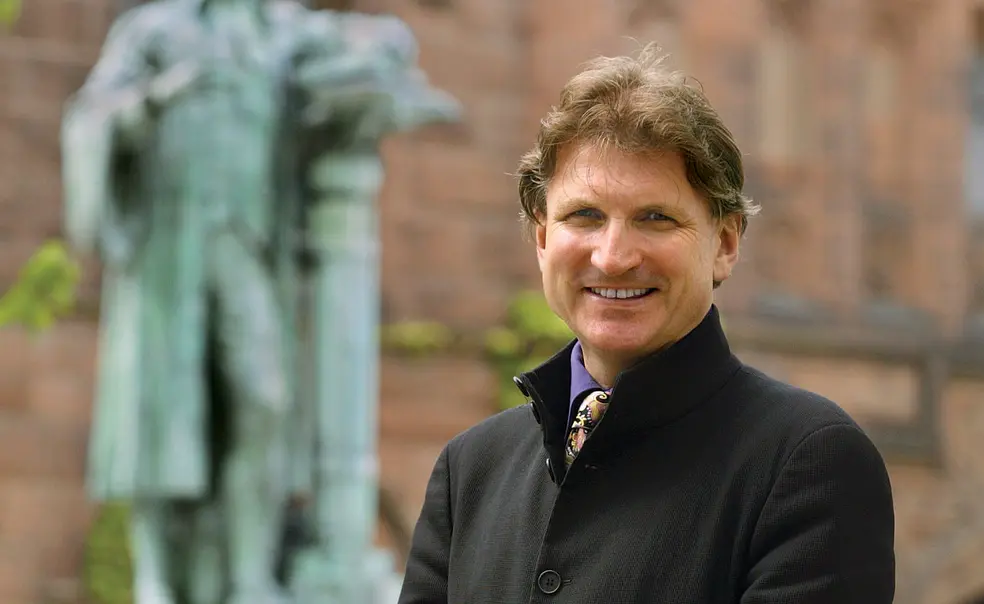A moment with...Nigel Smith
Nigel Smith came to Princeton nine years ago from Oxford University. He is now a professor of English specializing in 17th-century poetry, chairman of Princeton’s Renaissance Studies Committee, and bass player and songwriter for the rock band Rackett (Princeton poet Paul Muldoon also is in the band). Smith’s latest book has a rather provocative title: Is Milton Better than Shakespeare? Smith a fierce advocate of John Milton, the author of the epic poem Paradise Lost, spoke with PAW contributor Merrell Noden ’78.
Why do you feel the need to defend Milton?
Two reasons. First of all, it is his 400th birthday this year, and secondly, he’s lost his standing. He was, I think for the Victorians, the equal of Shakespeare. And I suspect he might have been even more popular than Shakespeare in colonial America. He’s a fantastic, daring poet. But the general reader doesn’t see that, because he’s got a reputation for being difficult so people don’t go to him. I think Milton is one of the great radical rethinkers of many difficult predicaments, as well as an amazingly gifted poet just on the technical level.
Shakespeare was writing for the stage, creating believable men and women, and Milton was writing to make arguments. Does that make a difference?
I think all of that is true, and that explains why it’s apples and oranges. And of course you can derive thought systems in Shakespeare’s plays. There’s a way in which the problem plays are wonderfully intelligent explorations of the meaning of justice. I do see something more in Milton’s daringness, the daringness to rewrite a big chunk of the Bible and then to suggest almost that it should be replacing the Bible. There’s always in Milton that kind of overstepping of what appears to be the limit of what he should be doing.
But is he better than Shakespeare? Or is he simply more relevant for us, now, in the United States?
The respects in which I rank Milton above Shakespeare are to do with the writerly projects Milton takes on. They’re not to do with relevance. However, we have lived for some time in a moment when politics and thinking about politics matter. Milton fuses these different aspects that are often separate, so that the political and religious pamphleteer and the poet are one — he called his poetry the work of the right hand, and the pamphleteering the work of the left hand. But both hands belong to one intelligence.
Milton raises some very relevant questions about the historical predicament we find ourselves in. One example would be: Is Samson a terrorist in Milton’s portrayal? That was an argument that [Oxford professor] John Carey raised in the TLS [Times Literary Supplement]: What do we do with a text like this, where you have this massive act of murderous resistance produced by the hero of the poem?
Milton’s treatment of free will, of slavery and liberty — these are all things that haven’t gone away. Jefferson and Adams were keen readers of Milton. Miltonic language is embedded in the language of the Constitution and the language of politics in the late 18th and early 19th centuries. I think Milton wrote Paradise Lost as a guide to how to keep your liberty. To Milton, a king will always land you under tyranny. Single rule is bad. He’s one of the great English republicans.
Another poet, Princeton professor Paul Muldoon, writes the lyrics for your band, Rackett.
When I first came to Princeton, Paul took me out and to a big extent got me settled here. I noticed all these old cassettes on the floor of his Volvo. And I realized we had a common interest. Paul loves going to concerts. I realized quickly how important the achievements and the charisma of the great troubadours are to him as a poet. Dylan, of course. Ray Davies. Bruce [Springsteen] is very important to Paul. And Warren Zevon, with whom he wrote some songs.
It was the beginning of 2004. I had been teaching in summer school that previous summer in Santa Fe. I played in a Native American and Hispanic rock ’n’ roll band. I sent Paul a picture of me onstage with a Native American lead guitarist. [Wearing a] cowboy hat. Imagine coming to America and doing that! Fantastic! And I sent it to Paul, and as always with Paul, a few minutes later a reply came back: “We’re having a band. Please set the attached lyrics to music soon.” So I went down into my basement and I took this lyric, and I wrote a song and recorded it. And that’s still a song that’s right in the middle of our set. It’s “Meat and Drink,” from [the album] Standing Room Only.













1 Response
Terry Vance ’77
10 Years AgoMilton, the Bard, Bluto
Animal House Henry V